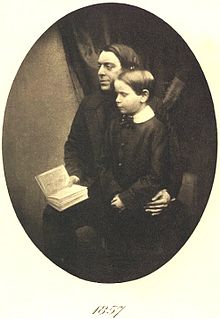
Philip Henry Gosse, known to his friends as Henry, was an English naturalist and populariser of natural science, an early improver of the seawater aquarium, and a painstaking innovator in the study of marine biology. Gosse created and stocked the first public aquarium at the London Zoo in 1853, and coined the term "aquarium" when he published the first manual, The Aquarium: An Unveiling of the Wonders of the Deep Sea, in 1854. His work was the catalyst for an aquarium craze in early Victorian England.

Siegfried Loraine Sassoon was an English war poet, writer, and soldier. Decorated for bravery on the Western Front, he became one of the leading poets of the First World War. His poetry both described the horrors of the trenches and satirized the patriotic pretensions of those who, in Sassoon's view, were responsible for a jingoism-fuelled war. Sassoon became a focal point for dissent within the armed forces when he made a lone protest against the continuation of the war with his "Soldier's Declaration" of July 1917, which resulted in his being sent to the Craiglockhart War Hospital. During this period he met and formed a friendship with Wilfred Owen, who was greatly influenced by him. Sassoon later won acclaim for his prose work, notably his three-volume, fictionalised autobiography, collectively known as the Sherston trilogy.

Sir Edmund William Gosse was an English poet, author and critic. He was strictly brought up in a small Protestant sect, the Plymouth Brethren, but broke away sharply from that faith. His account of his childhood in the book Father and Son has been described as the first psychological biography.

Edmund of Langley, 1st Duke of York was the fourth surviving son of King Edward III of England and Philippa of Hainault. Like many medieval English princes, Edmund gained his nickname from his birthplace: Kings Langley Palace in Hertfordshire. He was the founder of the House of York, but it was through the marriage of his younger son, Richard of Conisburgh, 3rd Earl of Cambridge, to Anne de Mortimer, great-granddaughter of Edmund's elder brother Lionel of Antwerp, 1st Duke of Clarence, that the House of York made its claim to the English throne in the Wars of the Roses. The other party in the Wars of the Roses, the incumbent House of Lancaster, was formed from descendants of Edmund's elder brother John of Gaunt, 1st Duke of Lancaster, Edward III's third son.

Walter Horatio Pater was an English essayist, art and literary critic, and fiction writer, regarded as one of the great stylists. His first and most often reprinted book, Studies in the History of the Renaissance (1873), revised as The Renaissance: Studies in Art and Poetry (1877), in which he outlined his approach to art and advocated an ideal of the intense inner life, was taken by many as a manifesto of Aestheticism.
Anthony Simon Thwaite OBE was an English poet and critic, widely known as the editor of his friend Philip Larkin's collected poems and letters.
Ann Thwaite is a British writer who is the author of five major biographies. AA Milne: His Life was the Whitbread Biography of the Year, 1990. Edmund Gosse: A Literary Landscape was described by John Carey as "magnificent - one of the finest literary biographies of our time". Glimpses of the Wonderful about the life of Edmund Gosse's father, Philip Henry Gosse, was picked out by D. J. Taylor in The Independent as one of the "Ten Best Biographies" ever. Her biography of Frances Hodgson Burnett was originally published as Waiting for the Party (1974) and reissued in 2020 with the title Beyond the Secret Garden, with a foreword by Jacqueline Wilson. Emily Tennyson, The Poet's Wife (1996) was reissued by Faber Finds for the Tennyson bicentenary in 2009.
Omphalos: An Attempt to Untie the Geological Knot is a book by Philip Gosse, written in 1857, in which he argues that the fossil record is not evidence of evolution, but rather that it is an act of creation inevitably made so that the world would appear to be older than it is. The reasoning parallels the reasoning that Gosse chose to explain why Adam had a navel: Though Adam would have had no need of a navel, God gave him one anyway to give him the appearance of having a human ancestry. Thus, the name of the book, Omphalos, which means 'navel' in Greek.

Peter Neville Frederick Porter OAM was a British-based Australian poet.

William Henry Heinemann was an English publisher of Jewish descent and the founder of the Heinemann publishing house in London.
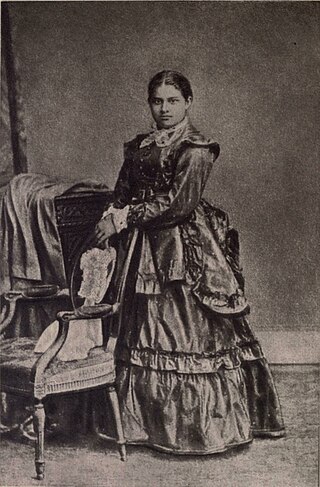
Tarulatta Datta, popularly known as Toru Dutt was an Indian Bengali poet and translator from British India, who wrote in English and French. She is among the founding figures of Indo-Anglian literature, alongside Henry Louis Vivian Derozio (1809–1831), Manmohan Ghose (1869–1924), and Sarojini Naidu (1879–1949). She is known for her volumes of poetry in English, Sita, A Sheaf Gleaned in French Fields (1876) and Ancient Ballads and Legends of Hindustan (1882), and for a novel in French, Le Journal de Mademoiselle d'Arvers (1879). Her poems explore themes of loneliness, longing, patriotism and nostalgia. Dutt died at the age of 21 of tuberculosis.

The New York Edition of Henry James' fiction was a 24-volume collection of the Anglo-American writer's novels, novellas and short stories, originally published in the U.S. and the UK between 1907 and 1909, with a photogravure frontispiece for each volume by Alvin Langdon Coburn. Two more volumes containing James' unfinished novels, The Ivory Tower and The Sense of the Past, were issued in 1917 in a format consistent with the original set. The entire collection was republished during the 1960s by Charles Scribner's Sons. The official title of the set was The Novels and Tales of Henry James, though the more informal title was suggested by James himself and appears as a subtitle on the series title page in each volume. It has been used almost exclusively by subsequent commentators.
Arthur Waugh was an English author, literary critic and publisher. He was the father of the authors Alec Waugh and Evelyn Waugh.
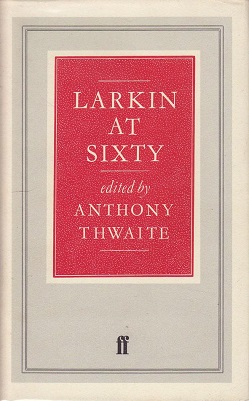
Larkin at Sixty (1982) is a collection of original essays and poems published to celebrate the sixtieth birthday of the English poet Philip Larkin. It was edited and introduced by Anthony Thwaite and published by Larkin's publishers, Faber and Faber. A poetic dramatisation of the launch of the book was written by Russell Davies.
Emily Bowes Gosse was a prolific religious tract writer and author of evangelical Christian poems and articles.
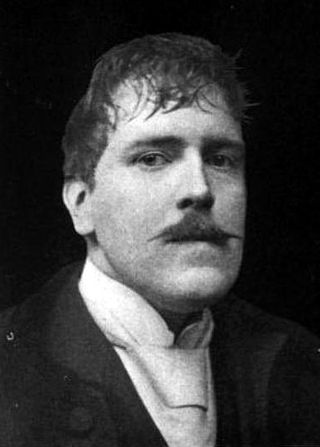
Robert Murray Gilchrist was an English novelist and author of regional interest books about the Peak District of north central England. He is best known today for his decadent and Gothic short fiction.
Where Adam Stood is a television play by Dennis Potter, first broadcast on BBC 2 in 1976. It is a free adaptation, wholly shot on film, of Edmund Gosse's autobiographical book Father and Son (1907).
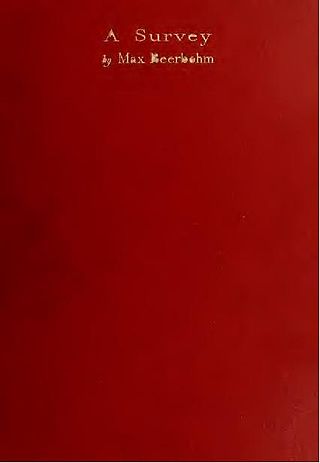
A Survey is a book of fifty-two caricatures and humorous illustrations by British essayist, caricaturist and parodist Max Beerbohm. It was published in Britain in 1921 by William Heinemann and in the United States in the same year by Doubleday, Page & Company of New York City.

Sir Philip Courtenay of Powderham, Devon, was the senior member of a junior branch of the powerful Courtenay family, Earls of Devon.
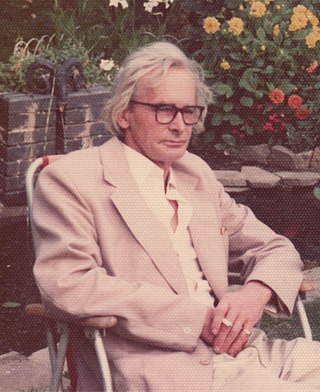
Richard Broke Freeman was a zoologist, historian of zoology, bibliographer of natural history and book collector. Known professionally as R. B. Freeman, he compiled comprehensive reference works on Charles Darwin and on P. H. Gosse. He was “a meticulous scholar” and a “brilliant bibliographer” who showed “a genuine modesty about his great erudition.” "It is darkly rumored among antiquarian booksellers that R. B. Freeman once missed a completely unrecorded and absurdly rare 1859 second issue of the first edition of The Origin of Species", a reviewer wrote in the Times Literary Supplement, "but this is also said to be the only mistake he has made during a lifetime of persistent scholarship and imaginative detective work in libraries, bookshops, sale-rooms, the attics of country houses and the trunks of the great-aunts of great men."

